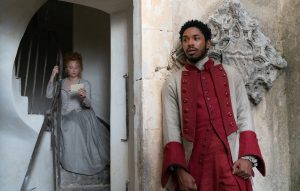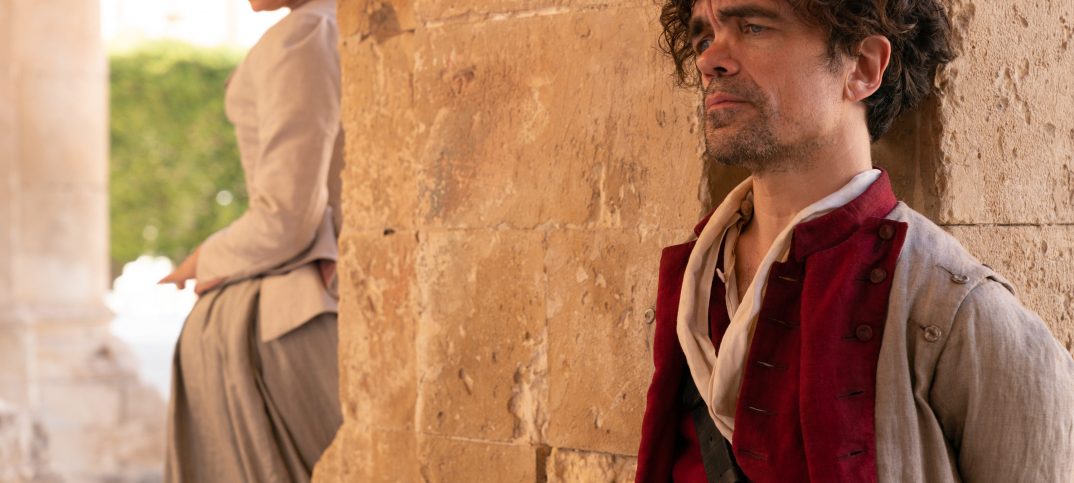By Jeffrey Sanzel
The works of prolific writer Edmond Rostand (1868-1918) included plays for legendary actor Sarah Bernhardt and Les Romanesques (1894), the inspiration for the musical The Fantasticks (1960). But his most enduring work is Cyrano de Bergerac (1897). Rostand based his drama on the life of French novelist, playwright, and duelist Savinien de Cyrano de Bergerac (1619-1655).

In the play, nobleman Cyrano is a cadet in the French Army. Articulate and talented, bold and brash, Cyrano has an exceptionally large nose. His extraordinary proboscis prevents him from expressing his love for his beautiful cousin, Roxanne, fearing his ugliness would cause her to reject him. So instead, he aids the handsome Christian Neuvillette in his courtship of Roxanne.
The first production opened on December 27, 1897, and starred Benoît-Constant Coquelin, who went on to play the role over four hundred times. Subsequent productions were mounted across the globe.
The longest-running Broadway production starred Walter Hampden, in a translation by Brian Hooker; his adaptation became the standard until the 1980s. The best-known Cyrano was José Ferrer, who received a Tony and an Academy Award for his portrayal. Other stars and other translators have since put their enduring impression on the story. Anthony Burgess turned his 1970 adaptation into the libretto for the musical Cyrano (1973), for which Christopher Plummer won a Tony. Steve Martin’s modern screenplay Roxanne (1987) earned him accolades as a writer and actor.
The story of the selfless soldier with the large nose and eloquent soul has touched audiences on stage and screen for over a century. The newest incarnation, the musical Cyrano, is directed by Joe Wright (Pride & Prejudice, Atonement, Anna Karenina, Darkest Hour, Pan) from a screenplay by Erica Schmidt, based on her 2018 stage adaptation for the off-Broadway production presented by The New Group.

CYRANO
A Metro Goldwyn Mayer Pictures film
Photo credit: Peter Mountain
© 2021 Metro-Goldwyn-Mayer Pictures Inc. All Rights Reserved.
Starring Peter Dinklage, the production features music by Aaron Dessner and Bryce Dessner (of the band The National). Rather than focusing on an exceptionally large nose, it is Dinklage’s diminutive size that sets him apart.
The plot of the Rostand remains, with Cyrano in love with Roxanne, but, afraid of rejection, he pours his heart and words into writing and coaching another man to win her heart: “I will make you eloquent while you make me handsome.”
But the tone is dark and raw, set in a gritty world. The sense of unrest, of a country at war, permeates the entire film. From the opening scene to the last moments, the unease reflects the restlessness of the story’s protagonist. Instead of the Cyrano beloved of his fellow soldiers and connected in the community, Dinklage is a figure of isolation.
With the absence of comradery, the loneliness creates a deeper poignancy. He says wryly, “I am living proof that God has a sick sense of humor.” But the depth of his pain is present. His yearning and struggle with unrequited love are heartbreaking, never too far from the surface. “My fate is to love her from afar.” Dinklage’s performance is nuanced, subtle, and honest.
However, taken as a whole, the film is uneven. The dialogue is a mix of occasional rhyming (that seems to disappear), genuinely eloquent free verse, and jarring anachronisms. Many classic speeches are gone, often feeling like Hamlet without “To be or not to be ….” The absence of Rostand’s whimsy and warmth are replaced with a harsher edge that serves some but not all the film.
Humor is rare. Oddly, one of the first lines, delivered by Roxanne’s duenna Monica Dolan), is one of the lone quips: “Children need love; adults need money.” But these flashes are rare.
Haley Bennett’s Roxanne is not a fluttering ingenue but as self-actualized as a woman of the era could be. She is best when paired with Dinklage, especially in the pastry shop that neatly bookends their final encounter. Wright directed the first scene in sharp cuts emphasizing the dynamic relationship.
Kelvin Harrison, Jr., makes for a likable, if too aware, Christian. Christian and Cyrano should be a study in contrast, with the former tongue-tied and awkward; he is never allowed to commit to the character’s social clumsiness. Ben Mendelsohn’s De Guiche is predatory, going from storybook villain to full-on monster. Bashir Salahuddin’s Le Bret is marginalized. Le Bret is meant to be Cyrano’s confidante and confessor; here, he is reduced to a few small scenes.

But the largest flaw is the unnecessary and intrusive score. Sounding quasi-Broadway pop, it consistently detracts from the flow of both the action and the passion. Musical construction is designed to transition into song when the characters’ emotions become too large for dialogue. In Cyrano, it seems the opposite. The energy rises only to be arrested by generic tunes and painfully prosaic lyrics.
Vocally, Harrison, Jr., has the strongest voice. Dinklage has a pleasant rumble, reminiscent of Leonard Cohen and Bennett is pleasant if unremarkable. An entire song is given over to the soldiers before battle. For some reason, the composers have opted for a Country-and-Western sound.
The designs are lavish, with a well-deserved costume Oscar nomination (Massimo Cantini Parrini and Jacqueline Durran). Jeff and Rick Kuperman’s choreography is intriguing if puzzling. The film is violent, with brutal sword fighting ending in death. Cyrano even sets fire to one of his attackers.
But ultimately, Cyrano belongs to Dinklage, and he shines. He says of Roxanne: “Even her imperfections are perfect.” The same could be said of Dinklage.
Rated PG-13, Cyrano is now playing in local theaters.







